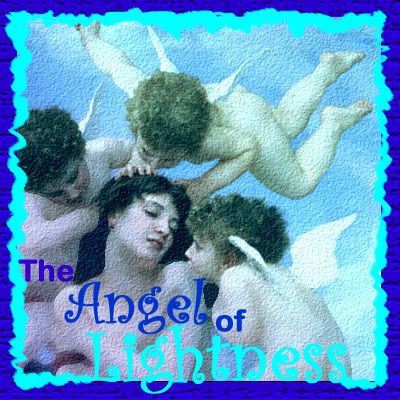
Bouguereau, William: Le Printemps, 1886;
Oil on canvas, 84 5/8 x 46 inches (215 x 117 cm),
Joslyn Art Museum, Omaha, Nebraska, USA.
The Angel of Lightness
by Anselm Grün
Pope John XXIII once wrote in his diary, “Giovanni, don’t take yourself so seriously!†He had something of the lightness that the Angel of Lightness wants to teach you. Perhaps this angel is easier for Italians to get than for the lugubrious Germans who take everything so seriously, who approach everything thoroughly and forcefully. There is a time for everything. Certainly it is good if we really tackle difficult problems. But especially with personal problems the forceful approach is not always the solution. The more we fight against our faults up front, the more counterpoise they develop. And then we have to worry about them all the time. The lightness of Pope John XXIII would be good for us then. He of all Popes who took his office not as seriously as some of his predecessors who broke down under the weight of their office, had the courage to call for a Council and setting the course for the future.
We would need the lightness especially for how we deal with ourselves. Many people don’t make any progress, because they take themselves so very seriously. They cannot forgive themselves for having faults they should not have any more at their age. So they consistently attempt to extinguish these faults. But the more they fight their faults, the more visible they become. And soon such austere fighters lose their patience with themselves. Either they will be even stricter with themselves, or they will give up the fight. The Angel of Lightness wants to teach us a different way. We don’t settle for simply having our faults. But we fight with a sense of humour. It’s not a tragedy for us, if we have failed once again. We take our being human easy, because we don’t have to take on everything on our own, because we know that we are carried in God’s hand. Who thinks that she has to solve all problems on her own, will carry her responsibility like a heavy burden, will find being human a difficult task. The lightness does not imply carelessness or negligence, instead it is embedded in the profound trust that we are in God’s good hand and that He takes care of us. And it contains the knowledge that we don’t have to prove anything to Him. Therefore it is not that bad if we fail now and again. Because we cannot make Him sad with that. It is only us who are angry about it, if we don’t live up to our own expectations.
The Angel of Lightness wants to lead us to a new freedom in how we deal with each other as well. Who lives, for example, as I do, in the community of a monastery, knows that you mustn’t take everything so seriously. Even in the monastery we are, and remain, human beings. The same is true for every kind of community, of course. Every mother, who brings up children, knows that it won’t help to be angry about the faults of her children all the time. There, too, the lightness is needed that is derived from the expectation that the children will grow out of it and will grow up one day. They are children, after all. They may make mistakes. They have to learn from their own mistakes.
Children who experience this lightness in their parents will have more faith in life than others, whose parents took everything so very seriously, whose parents interpreted the education of their children as a thesis that has to be as perfect as possible. Those who want to give their children a perfect education achieve the exact opposite as a rule.
Here, the lightness stems also from the trust that the children are not only our children, that their development is not entirely dependent on the “perfect†education we give them, but that they are also in God’s hand, that God sends His angel to every child to take care of them.
If we look at the angels jubilating around every manger at Christmas time, or the cherubs placed all over the churches during the Baroque era, we feel a touch of the lightness they radiate. They don’t take life as seriously as we do. They float and fly over some obstacles that we cling to, that we want to overcome by any means. The artists have understood some of the lightness of the angels by painting them young or even childlike, playful, full of inner freedom and gaiety. Among those many angels there is also the Angel of Lightness who has been given to us in order to light up the serious side of life and to convey the lightness of being to us.
© by Anselm Grün, 50 Engel für das Jahr, 1997;
translation by JunoMagic.

Song for December 13:
(Click pic!)
Tanz der Delphine (“Dance of Dolphins”)
by Hans-Jürgen Hufeisen,
album “Pegasus – Melodien der vier Winde” (“Pegasus – Melodies of the Four Winds”)

I am way behind. Guests, snow day, life, it is all eating my time and energy. I love this one. Nice music as always.
mk